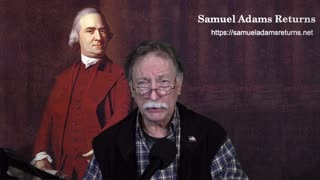Episode 438: Mercy, Lawfare and Discouragements – It’s On You To Do
Full description and references at: https://bit.ly/3vEFa2h
This weeks program ‘Mercy, Lawfare and Discouragements’ is straight out of the predictive works of Mercy Otis Warren and the sharp arguments during the 1760’s of Samuel Adams.
Mercy is predictive of out present in her work ‘Observations on the New Constitution By a Columbian Patriot,’ 1788. I will highlight the fundamentals that are distinctives of liberty, slavery, tyranny and despotism brought on by a Centralized government allowed for in the framework of the Constitution. Mercy lays it out plainly in this Anti-federalist pamphlet.
Sam Adams being an older contemporary of Mercy, grinds into preventative policy to advert the lawfare of 1764 as well as the discouragements to commerce, liberty, property and civil society in the Letter of Instruction to those elected to the Massachusetts Colonial House of Representatives.
History No Longer
History no longer holds any significance in ensuring that enshrined principles of governing humanity in a republic matter. In fact, as clearly pointed out in my programs over the last month, political and economic theology are rooted in the humanism of the last one-hundred years. Even more so now, the ‘progressives’ not only desire but are fully wiping fundamental history, virtue, morals and principles out of the common mechanisms of education, business, government and yes, even religion.
The Following is a direct quote from the Preface of ‘The Biblical Structure of History’ by Gary North, pages xii and xiii.
C. Gregg ‘Singer’s essay was titled “The Problem of Historical Interpretation.” He began his essay with this paragraph:
Some five years ago at an annual meeting of the American Historical Association the writer had the occasion to meet informally with a group of the more famous historians in attendance at that conference. The subject under discussion was the meaning and purpose of history. These half-dozen scholars were of the opinion that history lacks any decisive meaning and any discernible purpose. The writer then posed to this group of distinguished scholars one question: If this be the case, then why do we teach history? The scholars looked at him with surprise and even disgust, but no answer was forthcoming from any of them. The group broke up as each went to his own particular luncheon group and discussion of various phases of a subject which they could not really justify as part of a college curriculum and yet which they continue to teach as if the knowledge of it had some inherent value.
In the second paragraph, he drew a conclusion regarding the world of humanist academia:
This incident is by no means unique. The professional histori- ans in this country and in Europe have come to the place where they have little faith in the subject to which they have devoted their lives. Historians with increasing and distressing frequency are openly admitting that history has no meaning and shows little or no purpose or goals. But neither is this anti-intellectual attitude peculiar to the professional historians. The existentialist and positive philosophies have entered into the thinking of most areas of human thought and activity with devastating results. In conjunction with the Freudian school in psychology, they have made irrationalism and anti-intellectualism fashionable and have virtually removed the concepts of purpose and meaning from the thinking of many historians and those who proclaim themselves to be “social scientists.”
His assessment was correct. Leading historians in 1970 no longer had faith that history reveals any authoritative meaning or purpose. This lack of faith is far more widespread today. It had been building for half a century before Singer wrote his essay.’
Just my 2¢ is that defining and teaching history is now the scripting of ideologist instead of researched fact with foundation.
Read the rest at: https://bit.ly/3vEFa2h
-
 45:40
45:40
Samuel Adams Returns
1 month agoEpisode 440: Faithful To Foolishness - 18 USC Ch. 115
59 -
 14:55
14:55
SLS - Street League Skateboarding
4 days agoBest Trick Jam at SLS APEX 02 - Tyson Bowerbank, Yuto Horigome, Dashawn Jordan & more...
4.79K5 -
 LIVE
LIVE
Film Threat
5 hours agoVERSUS: THE ACOLYTE DESTROYS STAR WARS | Film Threat Versus
744 watching -
 13:11
13:11
Breaking Points
2 hours agoMacron Calls SNAP ELECTION After Right Wing EU SURGE
3.55K29 -
 2:00:08
2:00:08
Barstool Yak
3 hours agoThe Yak with Big Cat & Co. Presented by Rhoback | The Yak 6-10-24
6.96K14 -
 54:59
54:59
Ben Shapiro
3 hours agoEp. 1982 - Israel Pulls Off MIRACLE Rescue Of 4 Hostages…And The Left Laments
34K95 -
 43:38
43:38
Bright Insight
2 hours agoYou Won’t Believe This Disturbing Gobekli Tepe Update
19K69 -
 DVR
DVR
The Kevin Trudeau Show
1 hour agoThe Kevin Trudeau Show
862 -
 1:09:31
1:09:31
Russell Brand
5 hours agoBird Flu Pandemic SCAM?! New Lockdowns + Vaccines!
102K288 -
 2:56:24
2:56:24
The Charlie Kirk Show
3 hours ago2016 Redux + George Janko On-Set | Habba, Kassam, Janko | LIVE 6.10.24
72K25